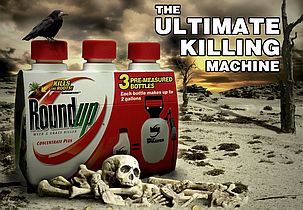
On last week’s radio show, my guest was Stephanie Seneff, PhD, a Senior Research Scientist at Massachusetts Institute of Technology (MIT). She gave us a wakeup call about the health risks from genetically modified foods and the Roundup-type weed killers that are now widely used even on non-GMO crops. There are many resources on her website. Her message was so important I thought I’d better review some key points.
GMO’s
What are we talking about? GMO is short for “Genetically Modified Organism”. These are also known as “Frankenfoods” because genes from animals, bacteria and viruses are inserted into plants. The goal is usually of commercial interest like making the plant produce its own insecticides or making the plant resistant to weed killers.
What is the problem? Even though 88 percent of the corn and 94 percent of the soy grown in the US is GMO, there has been little if any approval-related research done to prove there will not be allergic reactions, damage to our probiotic bacteria or other long-term health effects. For example, genes from bacteria are spliced into the DNA of certain food crops to release a certain insecticide. Animal studies show it damages the kidney, liver, heart, adrenal glands, spleen, and blood system. Since the toxin becomes part of the plant, our only escape is to avoid GMO corn, soy, and sugar beets. See Roundup below for what may be the most obvious risk.
Doesn’t the government protect us? In a word, No. Even though most countries do not consider GMO foods safe, in the US food labels are not even required to say if the product contains GMO ingredients. The big money players in the battle (think Monsanto, Dow and the cereal companies) spend a lot of money keeping the public in the dark about GMO’s.
ROUNDUP® / GLYPHOSATE HERBICIDES
The purpose? Roundup is the most well-known in this class of potent weed killers. They kill ALL plants. That would obviously be bad for business if they killed the crops as well. That’s where the GMO’s come in. Varieties of plants were developed to resist the herbicide. The productivity benefit may be short-lived because, similar to the problem with disease-causing bacteria becoming antibiotic-resistant, weeds have developed resistance to Roundup. Money-motivated manufacturers have taught farmers to spray non-GMO crops to dry them out for a faster harvest.
Health effects. The World Health Organization says glyphosates is a probable cause of cancer in humans. Glyphosate has been responsible for thousands of deaths among farmers in India and El Salvador. It has been linked to breast cancer, leukemia, fatal kidney disease, liver damage, autism, reduced fertility, birth defects, Parkinson’s, digestive issues and so on. Steven Gundry, MD in his well-documented book The Plant Paradox: The Hidden Dangers in “Healthy” Foods That Cause Disease and Weight Gain says glyphosate disrupts metabolism, paralyzes some crucial liver enzymes, raises cholesterol, increases food sensitivities and causes chronic disease. There may be many more issues because the chemical damages our gut bacteria, resulting in thyroid trouble, weight gain and so on. Since these herbicides damage soil organisms, they create nutritional deficiencies in the food crops. That means we are less well nourished. (But who cares? No one in the food chain is responsible for nutrition—certainly not Monsanto.)
Our exposure. 93% of children tested had detectable metabolites of glyphosates in their bodies. How did they get there? Not only due residues of those toxic chemicals stay on the food we eat and find their way into the water, they remain on the grains fed to agricultural animals. Therefore, we get them secondhand just like we do antibiotics fed to farm animals. Glyphosate is even finding its way into drugs and vaccines.
What about regulation? Well, there isn’t much. Our US Department of Agriculture does not test for residues. Glyphosate is tested only short term, not in small doses over years. Worse yet, it isn’t tested with the “inactive” ingredients used in the actual products that increase its potency hundreds of times. So, glyphosate is conveniently considered “relatively safe”. It is supposedly at least better than the herbicides it replaced. (Should we be comforted if they are not killing quite as many of us as they used to?)
What can we do? Learn more and find sources of non-GMO foods at NonGMOproject.org. Buy organic foods. (Remember “natural” does not mean organic.) Look for a Certified Organic seal or a seal with a butterfly that states “Non-GMO Project Verified.” Note that conventional (not organic) whole grains may have greater herbicide residues on them because their outside hull is still attached. Buy pasture-raised meat and dairy products to avoid secondhand glyphosate. Dr. Seneff recommended this book as a source of information about what is most contaminated: Poison Foods of North America: Guide to navigating the glyphosate mine field in our food web (Kindle Edition)
Support non-profit groups like JustLabelIt.org that lobby for clear labeling of GMO foods and The Environmental Working Group that work to protect us from toxic chemicals. Don’t use RoundUp® or the like at your home. Check out several natural alternatives offered by the Dirt Doctor on this page of his site.










 September 14, 2017
September 14, 2017 